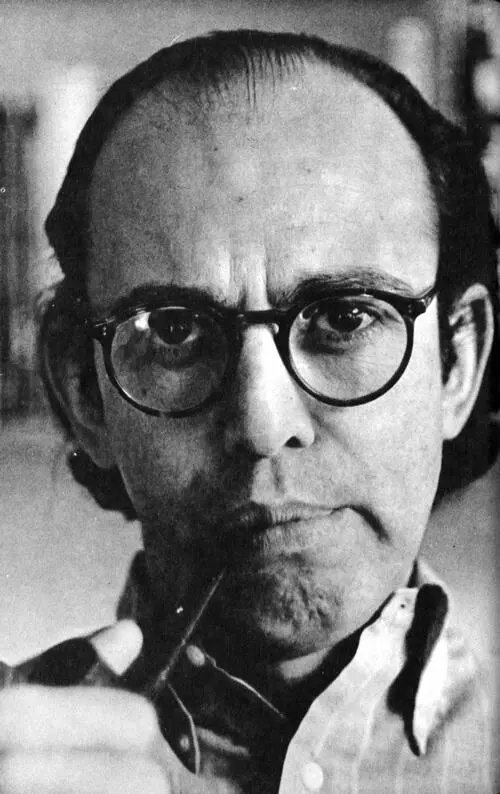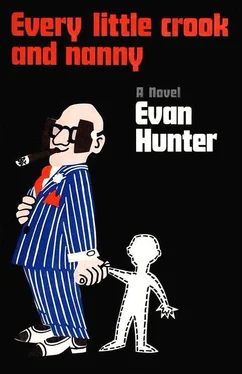She missed little Lewis.
Suddenly — with the scent of suntan lotion rising from Marcia Leavitt’s back, and the sound of muffled voices drifting over the sparkling water of the pool, the muted Italian of beachboys talking to busboys, the sound of silverware clinking, a jet droning overhead against the pristine sky — suddenly she missed her ten-year-old son with a desperation she had not felt since the first time she stepped onto the stage at the old Triboro Theater on 125th Street, a slip of a sixteen-year-old girl with enormous tits even then, and the lights went out on cue, and she discovered that her G-string wasn’t fluorescent as the manager had promised her, and nobody could see her spectacular grinds in the dark. Carmine had later visited the manager in the hospital and brought him a dozen roses after he had his terrible fall from the top of the second balcony.
She sure missed her son.
Maybe she could talk Carmine into cutting the trip short and taking her home.
Like maybe tomorrow.

Luther Patterson talked out loud to himself much of the time, but that was only because his wife, Ida, was such a quiet woman. Ida was quiet because she was never quite certain whether Luther was addressing her or Simon or Levin. Luther’s admiration and respect for Simon and Levin knew no bounds, and most of his external monologues were addressed to one or both of those giants. Much of Luther’s waking day, in fact, was spent either in solitary dialogue with Simon and Levin or else in trying to figure out how either of them would react to any situation then confronting Luther.
Simon and Levin were not male vocalists. (Once in a while, when Luther was feeling exceptionally musical, he did address a discourse or two to Simon and Garfunkel, but they were quite two different cups of tea.) Simon and Levin were only perhaps the two greatest living critics, dead or alive, in the United States of America.
If there were two things Luther Patterson aspired to be, they were both Simon and Levin. Whenever he thought of the unique combination of bile and style that both men possessed, he felt totally inadequate in his chosen profession, and not a trifle envious besides. Several months back, he had begun two separate scrapbooks, one of The Collected Works of John Simon, and the other of The Collected Works of Martin Levin. He studied these scrapbooks for hours on end, trying to absorb the unique quality both men brought to their work, the essence of which spelled greatness. On occasion, he entertained the bizarre notion that Martin Levin and John Simon were actually one and the same person. Had they ever, for example, been seen together on the same television show? If Martin Levin was not really a person inside John Simon clamoring to be let out, or vice versa, then how did one account for the identical precise, literate, informative, scrupulous, meticulous, painstaking, scholarly, incisive, penetrating, probing, resonant, intensely felt nature of their separate reviews and critical essays?
“Tell me, John Simon, are you really Martin Levin?” Luther shouted.
Ida, who knew right off he was not addressing her, did not answer him.
“I thought not,” Luther said. “That would be the same as claiming Shakespeare and Marlowe were one and the same. Why can’t people accept the fact that two literary phenomena can be contemporaries, working and reacting to the same environment in equally beautiful and sensitive ways without each being the other or vice versa? I ask you, Martin Levin.”
God, if only I could write like you, he thought, and went to his bookshelf and took down The Collected Works of Martin Levin, and scanned the clippings, trying to pick up little hints that might help him in his own critical forays. Expressions like “disappointingly tedious” sprang from the text, “has made his hero odious without making him interesting,” wonderful, wonderful. Or “The novel plods along at the same underpowered dramatic level,” oh God, to be able to put words together that way. In a near frenzy of ecstasy, Luther pulled down the companion volume of clippings, The Collected Works of John Simon, turning to a review at random (they were all so exquisitely composed, it hardly mattered where a person’s eye fell, the delight of absorbing true creativity was invariably his reward), and read aloud:
Let our youthful rebels beware: social and political commitment without commitment to articulateness and poetry will do little for the world beyond transforming it into a monstrous discothèque, free and equally brutalizing to all.
The words echoed in Luther Patterson’s high-ceilinged living room, “free and equally brutalizing to all,” a phrase that John Simon himself, were he not most certainly a modest man, might have emblazoned on his shield as a motto of sorts — “Free and Equally Brutalizing To All,” lapis on azure perhaps, with two gules pendant.
In a burst of familiarity, Luther called out, “Johnny, what do you think of that idea?” Receiving no reply, he replaced both cherished volumes on the shelf and went into the kitchen, where Ida was preparing lunch. He lifted the cover of the pot on the rear burner of the stove, picked up a tasting spoon, glanced at the ceiling again, and said, “John Simon, do you know I have a doctorate in comparative literature from Princeton University, do you realize that, John? Do you know that I was graduated summa cum laude, Phi Beta Kappa, third in my class? John Baby, let’s have a drink together one day — after I’ve collected, of course, after this is over and done with — sit together in the salon on my yacht and exchange literary bons mots, how I’d enjoy that, how I would truly enjoy that.” He put the cover back on the pot, and the spoon on the stove top. Then, because he was a critic, he said, “This soup stinks,” and went back into the living room.
If there was one thing Luther Patterson possessed, it was an enormous library. The one reason he had taken this huge tenth-floor apartment on West End Avenue (besides the cheap rent) was that it had a living room almost as long as a bowling alley, the length of which was covered from floor to ceiling with bookshelves, which in turn supported hundreds and hundreds of books, all of which Luther had carefully read and evaluated. Luther got the books free. He also got paid to read and evaluate them. He did not enjoy reading too much, but then, who did? In that one respect, he was truly envious of his colleague John Simon (he dared to whisper the word “colleague” only in the privacy of his own mind, as though sacrilegiously linking his own name with that of, say, George Bernard Shaw or William Jennings Bryan). Simon not only reviewed books, he also had the opportunity of seeing a lot of plays and movies free before expressing his carefully considered opinions. That was a very nice aspect of the profession, Luther thought. Simon’s profession, not his. Luther reviewed only books. Always books. For unimportant journals and obscure publications. Books all the goddamn time. The only way he ever got to see a play free was to sneak in during the intermission and then look around in the dark for an empty seat. He never did this when he was with Ida. Ida disliked dishonesty of any sort. She wasn’t even too keen on his having kidnaped Lewis Ganucci.
Luther sat in his high-ceilinged, book-lined living room overlooking West End Avenue, tapped the balls of his fingers ever so lightly together, and wondered how the Ganucci lad was doing. He had locked the son of the retired soft drinks magnate in the back bedroom of the apartment, where any cries for help would register only on the blank brick wall of the adjacent building. He had then driven back to Larchmont in his 1963 hardtop Chevrolet and put the ransom note in Carmine Ganucci’s mailbox. He had felt a thrill of accomplishment as he slid the envelope in with the morning mail. Not the same thrill he had felt while composing the note, of course, nor even the same thrill he had experienced when stealing into the millionaire’s mansion last night and clapping his hand over the boy’s mouth and spiriting him away; no, that had really been quite exciting.
Читать дальше













